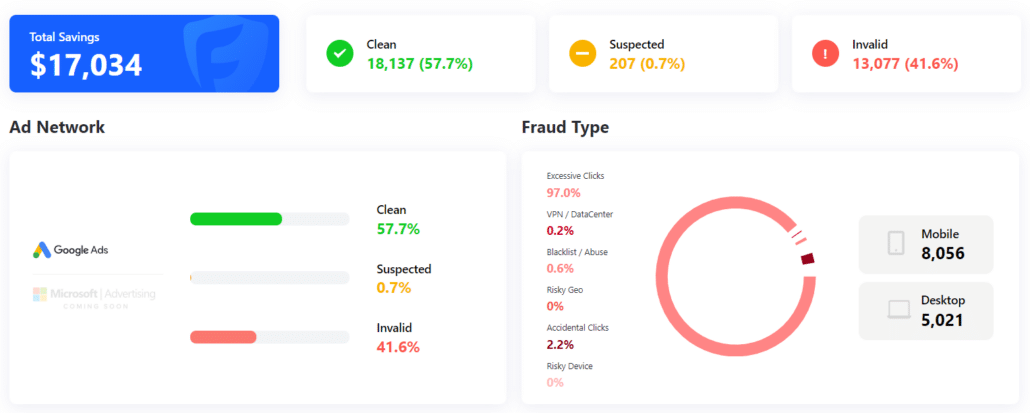You’d think, by now, that Meta and Google would have solved this, but apparently they haven’t.
Whilst all digital marketing platforms have some form of protection from fraud, it’s not good enough to protect you from fraudulent clicks on your ads.
Fraud Protection is provided by Clikk to Google Ads users for free, by Fraud Blocker.
The image below shows the stats from all the Google Ads accounts we manage.
There’s a combination of high budgets and low accounts, but as you can see 40% of traffic is invalid or fraudulent.
Fraud Blocker is actively preventing this loss for our clients. Below you can see the stats for September 2023.

How Does Ad Fraud Work?
Ad fraud harms the advertising business by deceiving advertisers into paying for ads that aren’t actually seen or clicked on. It’s a complicated problem, and everyone from ad networks to publishers and even internet users can be affected. Different types of ad fraud affect different parts of the advertising process, but they all reduce the amount of money advertisers make from their ads, which is called ROAS.
How do they do Ad Fraud?
An ad fraud bot is a computer program that fakes human activity by clicking repeatedly on ads to create fake traffic on websites.
These bots are often used together in a network called ‘botnets’ which use different IP addresses to avoid detection.
Click farms, where humans click on ads for money, have started to use bots instead of real people as they are cheaper and harder to detect.
This makes it difficult to tell real people’s activity from bot traffic. People who want to advertise online need help from companies that specialize in spotting fake traffic to make sure they are not paying for fake clicks.
Popular platforms like Google and Facebook can’t differentiate genuine user activity from fake traffic. Working with ad fraud detection vendors can help spot these problems.
How do I avoid Ad Fraud?
If you have a Google Ads service with us, we include fraud protection in all of our plans.
If you are with another agency, I would recommend looking into which Fraud Detection and Mitigation platform you’d like to use.
I would look for a service which gives you a trail or lets you connect your account to monitor your account to see if there’s value in paying for protection. This option lets you connect your account, without actively blocking fraudulent traffic. If you can see you will be saving more than the monthly subscription to protect your account, it’s worth signing up.
Other than that, you would need to find a way to detect and block potential fraud, which is possible but needs some I.T. skills most businesses don’t have.
How Does Fraud Blocking Work?
Ad Fraud starts from a device connected to the internet. That can be a mobile, a laptop or a botnet.
Every device has something called an IP address, which is a number representing the digital equivilent of a street address.
However, the internet is a tricky place, and it’s possible for fraudsters to mask their IP address, their location, to the point where they are anonymous.
For example, a business which commits ad fraud for profit, would use VPNs which mask their identity.
They could also have access to a botnet, which is a group of compromised computers owned by unsuspecting members of the public who have accidentally installed malware.
Even with all of these tools at their disposal, fraud blockers have overcome these issues by working with internet providers and marketing platforms like Google and Meta to detect and block known fraudulent IPs or even suspected ones.
Anti-fraud platforms create blacklists of IP addresses which are added, and removed as required, to stop fraudsters from even seeing your ads.
If they can’t see the ad they can’t click it, so you don’t have to pay for a click which wasn’t a legitimate customer.
Want to know more?
Some of this information has come from the recently released report by Juniper Research
You can read the whole report: here.



